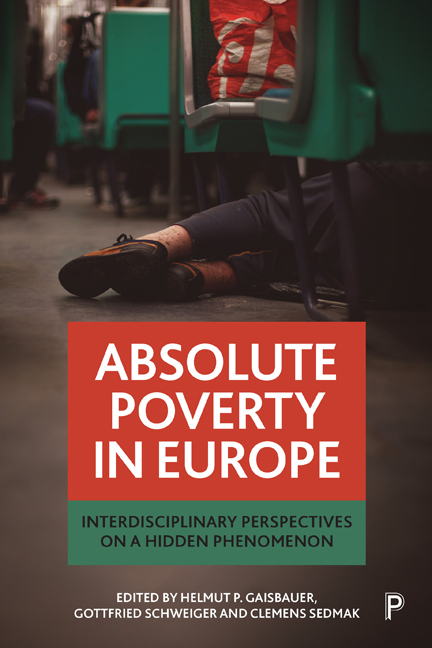Book contents
- Frontmatter
- Contents
- List of figures and tables
- Notes on contributors
- 1 Absolute poverty in Europe: introduction
- Part One Conceptual and methodological challenges
- Part Two Key issues for the absolute poor
- Part Three Policy responses to absolute poverty in Europe
- Part Four Ethical perspectives on absolute poverty in Europe
- Conclusion responding to the dark reality of absolute poverty in European welfare states
- Index
7 - Housing deprivation
Published online by Cambridge University Press: 27 April 2022
- Frontmatter
- Contents
- List of figures and tables
- Notes on contributors
- 1 Absolute poverty in Europe: introduction
- Part One Conceptual and methodological challenges
- Part Two Key issues for the absolute poor
- Part Three Policy responses to absolute poverty in Europe
- Part Four Ethical perspectives on absolute poverty in Europe
- Conclusion responding to the dark reality of absolute poverty in European welfare states
- Index
Summary
Introduction
This chapter examines the housing situation of households that may be considered to live in absolute poverty in the EU. As poverty is multidimensional, those living on inadequate incomes are likely to be deprived in a variety of ways relating to aspects of their housing. The chapter assesses the extent to which such households experience housing problems including overcrowding and substandard dwelling quality. It also explores some housing-related risks they face, specifically burdensome housing costs and rent/mortgage arrears. These risks significantly increase their probability of becoming homeless. In addition, people experiencing these problems are also likely to have periodic and/or ongoing challenges paying for other essential goods, such as food and energy.
Housing deprivation such as poor-quality dwelling, unaffordability and insecurity have been linked to a range of social problems such as lower quality of life and wellbeing (Mulder, 2007; Burgard et al, 2012; Cannuscio et al, 2012); physical and mental health problems, particularly housing which suffers from dampness and mould (Bentley et al, 2011; Rollins et al, 2012; Webb et al, 2013; Marmot, 2015; Mendell, 2015; Reeves et al, 2016) and access to jobs, schools, amenities and social networks (Mulder, 2007; Acolin and Wachter, 2017). There is a growing body of work revealing that residents of poor housing frequently experience energy poverty which may result in or exacerbate health problems (Healy, 2003, 2016; Liddel and Morris, 2010). Extremely poor housing conditions found in many of the new EU member states of Central and Eastern Europe (CEE) (Tosics, 2017a, 2017b; Tosics and Hedegus, 2017; Tsenkova and Lowe, 2017; Turcu, 2017). The effects of living in such poor residential environments on morbidity and life expectancy have been highlighted in one study of the CEE countries (Bonnefoy et al, 2003).
The next section reviews the existing literature on housing deprivation in Europe. The chapter proceeds by describing the data and methods used in our analysis of these problems, including data from the EU Survey on Income and Living Conditions. Given the limitations of household surveys in capturing information on certain groups living in ‘extreme poverty’, the final section of the chapter focuses on a case study of one group which experiences extreme housing exclusion in a relatively wealthy European society – the Roma.
- Type
- Chapter
- Information
- Absolute Poverty in EuropeInterdisciplinary Perspectives on a Hidden Phenomenon, pp. 137 - 158Publisher: Bristol University PressPrint publication year: 2019



